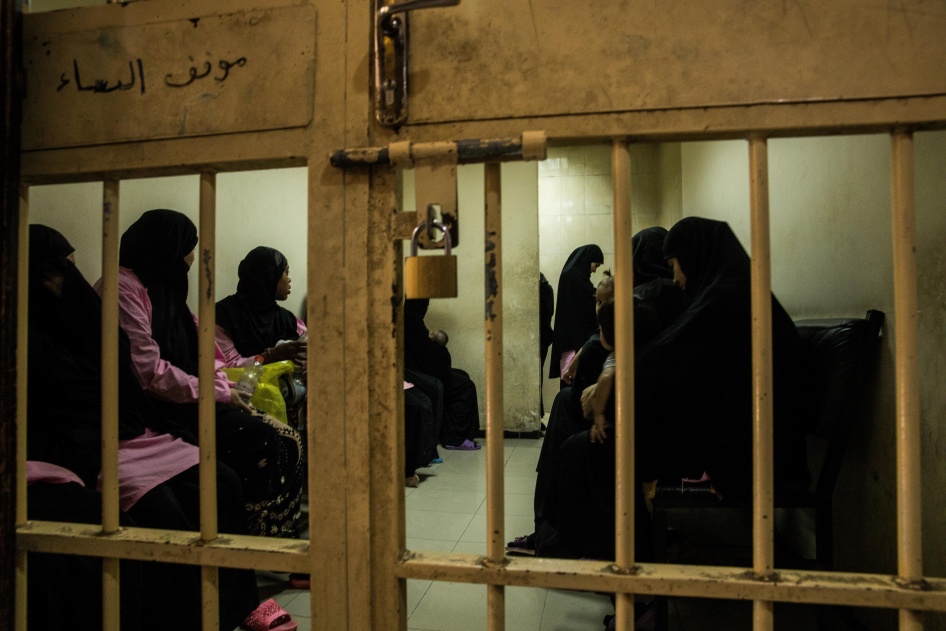(New York) – The government of Trinidad and Tobago should urgently bring home Trinidadian children and their mothers imprisoned in Iraq because of their alleged association with the Islamic State (ISIS), Human Rights Watch said today. Four Trinidadian women have been held along with their seven children, aged approximately 7 to 15, for nearly seven years.
On May 2, 2024, Iraqi prison authorities forcibly removed two Trinidadian brothers, ages 13 and 15, from their mother’s cell in Rusafa women’s prison in Baghdad and transferred them to a cell with other youths. Their mother, in a voice recording shared with Human Rights Watch, expressed fear that the two boys would be transferred to another prison. She said her youngest son suffered from asthma, anemia, and malnutrition.
“Trinidad and Tobago has publicly promised that it would bring home its nationals from Iraq and Syria, but not a single Trinidadian has returned home in more than five years,” said Jo Becker, children’s rights advocacy director at Human Rights Watch. “These children, who are not responsible for any crime, should be in school in Trinidad and Tobago, not languishing in an Iraqi prison.”
The mother in the voice recording expressed further concern about her younger son with health problems: “They took my son from me, they told me he was too big to be staying in a cell with us. They put him in a cell with about 10 boys. We have no education for our children. Nothing. We are going on our seventh year in prison and our children are growing up here.”
Iraqi authorities are holding an estimated 100 children with their mothers at Rusafa prison. Many of the women are foreign nationals who have been charged with or convicted of terrorism-related offenses.
The imprisoned women said that they are willing for their children to be returned to Trinidad and Tobago without them. They said the Red Cross has visited them and that they communicated with the repatriation committee established by Trinidadian Prime Minister Keith Rowley in March 2023, but have had no response from the government regarding their or their children’s situation.
The four women were convicted of ISIS affiliation by Iraqi courts. Human Rights Watch has found serious, widespread flaws in the prosecutions of terrorism suspects, including foreign women. Three of the women are held with five of the children in Rusafa prison, where the women are serving 20-year sentences. A court in the Kurdistan region of Iraq convicted the fourth, who is being held with her two children in Erbil. She recently completed her 6-year sentence and is technically free to leave the prison, but the Trinidadian government has made no effort to assist her return.
The Iraqi authorities’ apparent denial of the children’s right to education over many years, possible responsibility for their lack of access to health care and adequate food, and recent separation of children from their mothers should galvanize Trinidadian authorities to urgently seek their nationals’ repatriation, Human Rights Watch said. The Iraqi and Trinidadian authorities should weigh the children’s best interests and right to family unity and consider repatriating both the children and their mothers, so their children could regularly visit their mothers as they serve out their sentences in Trinidad and Tobago, Human Rights Watch said.
“We are here just waiting, and time is wasting,” said one of the imprisoned Trinidadian women in a voice recording shared with Human Rights Watch on May 4. “Our children remain uneducated without any knowledge.”
A February 2023 Human Rights Watch report documented the unlawful detention of Trinidadian nationals in life-threatening conditions in Kurdish-controlled northeast Syria. Since 2019, at least 39 countries have repatriated well over 8,000 of their nationals from the region. Trinidad and Tobago has repatriated none of their nationals during that time.
“Trinidad and Tobago’s prime minister has pledged to bring the Trinidadians detained in Iraq and Syria home,” Becker said. “He shouldn’t wait any longer.”








